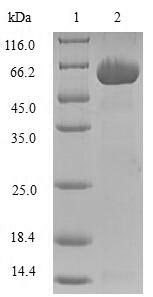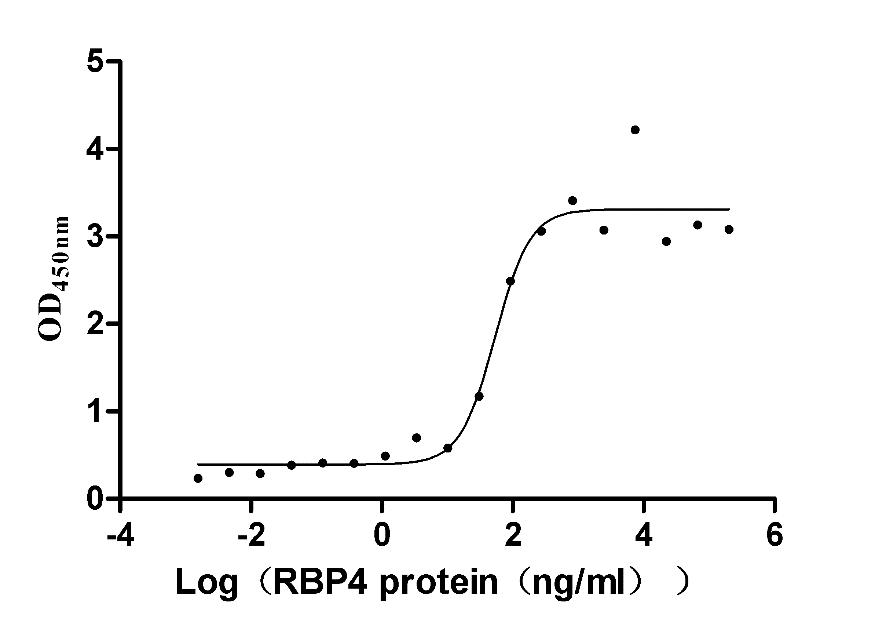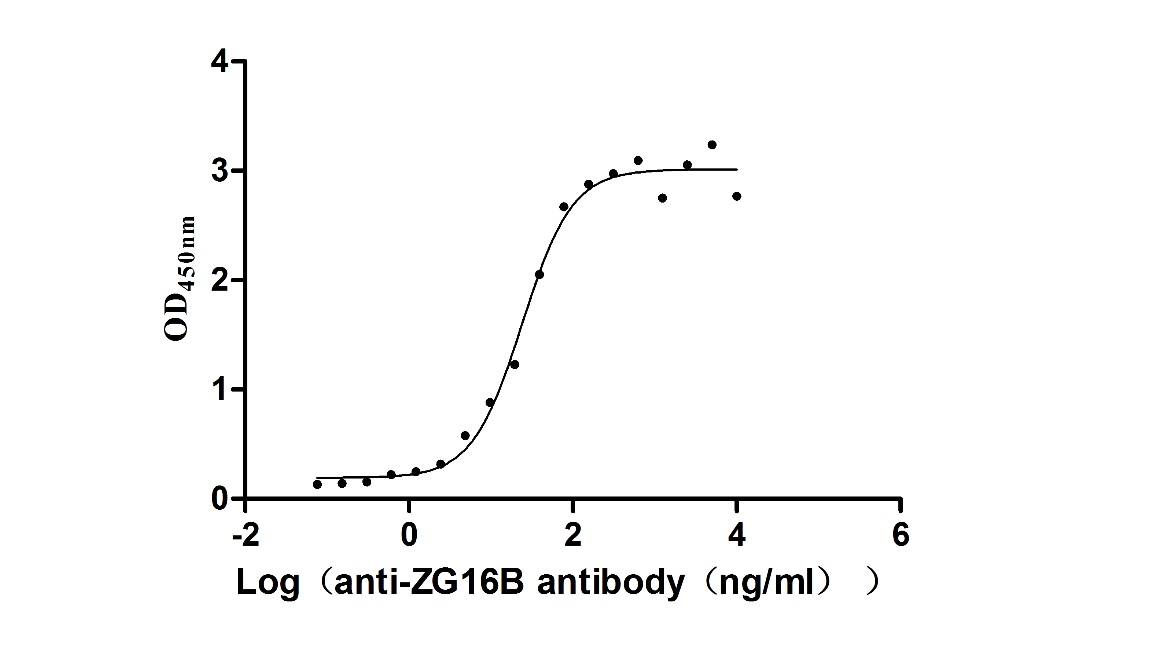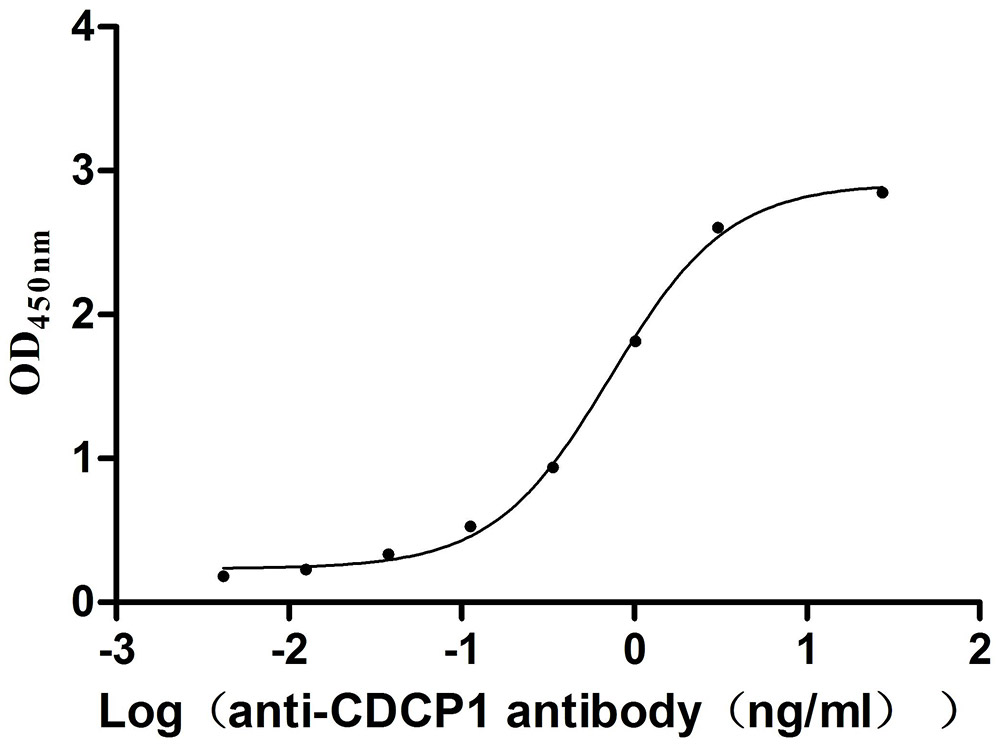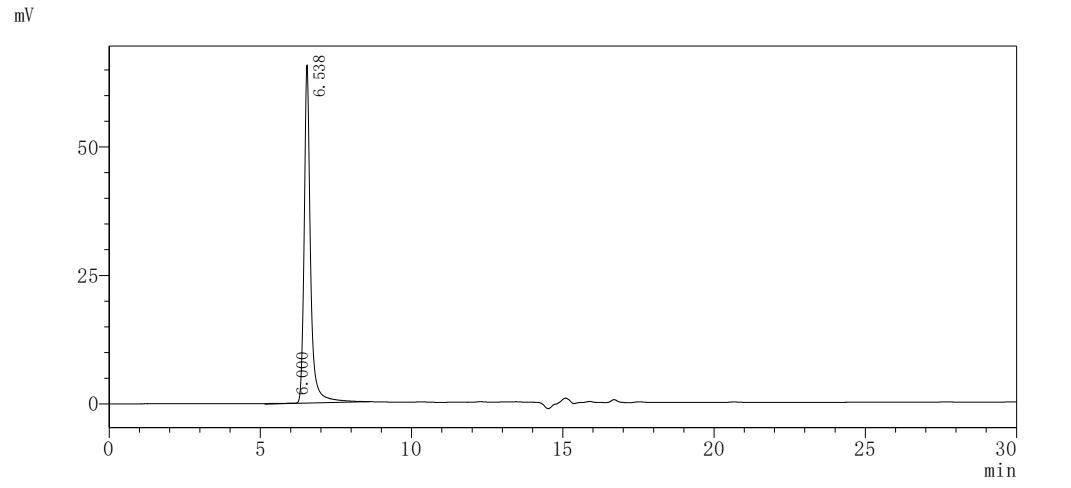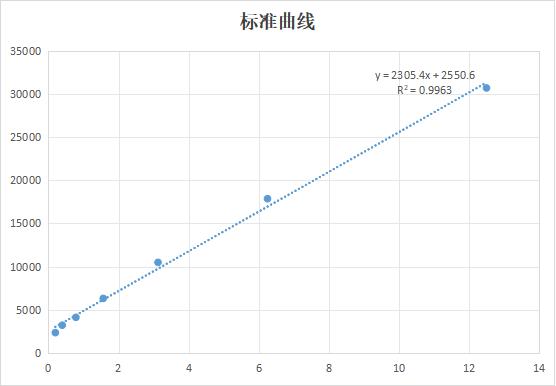Recombinant Human Aldo-keto reductase family 1 member C3 (AKR1C3)
In Stock-
中文名称:Recombinant Human Aldo-keto reductase family 1 member C3(AKR1C3)
-
货号:CSB-EP001544HU
-
规格:¥1344
-
图片:
-
其他:
产品详情
-
纯度:Greater than 90% as determined by SDS-PAGE.
-
基因名:AKR1C3
-
Uniprot No.:
-
别名:17 beta HSD 5; 17 beta hydroxysteroid dehydrogenase type 5; 17-beta-HSD 5; 17-beta-hydroxysteroid dehydrogenase type 5; 2-dihydrobenzene-1; 2-diol dehydrogenase; 20 alpha-hydroxysteroid dehydrogenase; 20-alpha-hydroxysteroid dehydrogenase; 3 alpha hydroxysteroid dehydrogenase type II; 3-alpha-HSD type 2; 3-alpha-HSD type II; 3-alpha-HSD type II; brain; 3-alpha-hydroxysteroid dehydrogenase type 2; AK1C3_HUMAN; AKR1 C3; Akr1c18; AKR1C3; Aldo keto reductase family 1 member C3; Aldo-keto reductase family 1 member C3; brain; Chlordecone reductase; Chlordecone reductase homolog HAKRb; DD-3; DD3; DDH1; DDX; Dihydrodiol dehydrogenase 3; Dihydrodiol dehydrogenase type I; Dihydrodiol dehydrogenase X; HA1753; HAKRB; HAKRe; hluPGFS; HSD17B5; Indanol dehydrogenase; KIAA0119; PGFS; Prostaglandin F synthase; Testosterone 17-beta-dehydrogenase 5; Trans-1; Trans-1,2-dihydrobenzene-1,2-diol dehydrogenase; Type IIb 3 alpha hydroxysteroid dehydrogenase
-
种属:Homo sapiens (Human)
-
蛋白长度:Full Length
-
来源:E.coli
-
分子量:63.9kDa
-
表达区域:1-323aa
-
氨基酸序列MDSKHQCVKLNDGHFMPVLGFGTYAPPEVPRSKALEVTKLAIEAGFRHIDSAHLYNNEEQVGLAIRSKIADGSVKREDIFYTSKLWSTFHRPELVRPALENSLKKAQLDYVDLYLIHSPMSLKPGEELSPTDENGKVIFDIVDLCTTWEAMEKCKDAGLAKSIGVSNFNRRQLEMILNKPGLKYKPVCNQVECHPYFNRSKLLDFCKSKDIVLVAYSALGSQRDKRWVDPNSPVLLEDPVLCALAKKHKRTPALIALRYQLQRGVVVLAKSYNEQRIRQNVQVFEFQLTAEDMKAIDGLDRNLHYFNSDSFASHPNYPYSDEY
Note: The complete sequence including tag sequence, target protein sequence and linker sequence could be provided upon request. -
蛋白标签:N-terminal GST-tagged
-
产品提供形式:Liquid or Lyophilized powder
Note: We will preferentially ship the format that we have in stock, however, if you have any special requirement for the format, please remark your requirement when placing the order, we will prepare according to your demand. -
缓冲液:Tris-based buffer,50% glycerol
-
储存条件:Store at -20°C/-80°C upon receipt, aliquoting is necessary for mutiple use. Avoid repeated freeze-thaw cycles.
-
保质期:The shelf life is related to many factors, storage state, buffer ingredients, storage temperature and the stability of the protein itself.
Generally, the shelf life of liquid form is 6 months at -20°C/-80°C. The shelf life of lyophilized form is 12 months at -20°C/-80°C. -
货期:3-7 business days
-
注意事项:Repeated freezing and thawing is not recommended. Store working aliquots at 4°C for up to one week.
-
Datasheet & COA:Please contact us to get it.
相关产品
靶点详情
-
功能:Cytosolic aldo-keto reductase that catalyzes the NADH and NADPH-dependent reduction of ketosteroids to hydroxysteroids. Acts as a NAD(P)(H)-dependent 3-, 17- and 20-ketosteroid reductase on the steroid nucleus and side chain and regulates the metabolism of androgens, estrogens and progesterone. Displays the ability to catalyze both oxidation and reduction in vitro, but most probably acts as a reductase in vivo since the oxidase activity measured in vitro is inhibited by physiological concentration of NADPH. Acts preferentially as a 17-ketosteroid reductase and has the highest catalytic efficiency of the AKR1C enzyme for the reduction of delta4-androstenedione to form testosterone. Reduces prostaglandin (PG) D2 to 11beta-prostaglandin F2, progesterone to 20alpha-hydroxyprogesterone and estrone to 17beta-estradiol. Catalyzes the transformation of the potent androgen dihydrotestosterone (DHT) into the less active form, 5-alpha-androstan-3-alpha,17-beta-diol (3-alpha-diol). Displays also retinaldehyde reductase activity toward 9-cis-retinal.
-
基因功能参考文献:
- Genotype data on the AKR1C3 rs12529 SNP indicates that all three prostate cancer groups (New Zealanders, African Americans, and Caucasian Americans) have similar genotype and allele frequencies. The highest percentage of high-risk PC as a percentage of all PC were recorded for ever-smoker AA men with the AKR1C3 rs12529 CC genotype while the lowest was recorded for never-smoker NZ men with the CG+GG genotypes. PMID: 29920533
- AKR1C3 is a novel epithelial-mesenchymal transition driver in prostate cancer metastasis through activating ERK signaling. PMID: 30139661
- The GG genotype of AKR1C3 rs10508293 is associated with decreased risk for preeclampsia. PMID: 29777907
- AKR1C3 transcriptional regulation and its role in prostate cancer progression [review] PMID: 28359237
- Overexpression of AKR1C3 could result in the accumulation of prostaglandin F2alpha (PGF2alpha), which can not only promote prostate cancer cell 's proliferation but also could enhance prostate cancer cells resistance to radiation. PMID: 27385003
- The replacement of C154 with a residue possessing a bulky aromatic side-chain impairs the folding of the alpha-helix containing C154 and its neighboring secondary structures, leading to low thermostability of AKR1C3. PMID: 28025170
- Data suggest that, in breast cancer cells, expression of HSD17B5 and expression of GRP78 (an apoptosis inhibitor) are strongly but negatively correlated; GRP78 knockdown decreases breast cancer cell viability whereas HSD17B5 knockdown increases cell viability and cell proliferation. (HSD17B5, 17-beta-hydroxysteroid dehydrogenase 5; GRP78, 78 kDa glucose-regulated protein) PMID: 28457968
- AKR1C3 is the primary enzyme and CBR1 is a minor enzyme responsible for warfarin reduction in human liver cytosol. PMID: 27055738
- the present study suggests that AKR1C1, AKR1C2, AKR1C3, and AKR1C4 are closely associated with drug resistance to both CDDP and 5FU, and that mefenamic acid, an inhibitor of AKR1C, restores sensitivity through inhibition of drug-resistance in human cancer cells. PMID: 28259989
- a variant in the promoter region of HSD17B5 related to fetal androgen synthesis influences the genital phenotype in 21-Hydroxylase Deficiency females. PMID: 27082632
- Five common AKR1C3 polymorphisms were associated with decreased rates of exemestane catalysis. PMID: 27111237
- If our these findings can be reproduced in larger homogeneous cohorts, a genetic stratification based on the AKR1C3 rs12529 single nucleotide polymorphism, can minimize androgen deprivation therapy-related health-related quality of life effects in prostate cancer patients PMID: 27485119
- We identified strong associations between the studied AKR1C3 variants and UBC risk. The homozygous variant genotype of rs12529 was found to be inversely associated with UBC, and rs1937920 was shown to be associated with increased risk of UBC. None of the genotypes were found to be significantly associated with tumor characteristics. PMID: 27085562
- aldo-keto reductase 1C3-mediated prostaglandin D2 metabolism has a role in keloids PMID: 26308156
- The results suggest that decreased expression of AKR1C3 may be involved in development of gastric cancer and can be restored by Sodium Butyrate. PMID: 27019068
- AKR1C3 expression is elevated in prostate cancer cell lines and primary prostate cancer, suggesting a link between AKR1C3 levels and the epigenetic status in prostate cancer cells. PMID: 26429394
- Aldo-keto reductase 1C3 is overexpressed in skin squamous cell carcinoma (SCC). AKR1C3 affects SCC growth via prostaglandin metabolism. PMID: 24917395
- these results indicated that the actions of AKR1C3 can produce FP receptor ligands whose activation results in carcinoma cell survival in breast cancer. PMID: 26170067
- and AKR1C3 may serve as a valuable therapeutic target in the treatment of castration-resistant prostate cancer PMID: 25754347
- AKR1C3 activation is a critical resistance mechanism associated with enzalutamide resistance. PMID: 25649766
- In the present study, crystal structures of complexes of HSD17B5 with structurally diverse inhibitors derived from high-throughput screening were determined. PMID: 25849402
- AKR1C3 mRNA expression did not differ between bipolar disorder patients in any affective state or in comparison with healthy control subjects. PMID: 25522430
- A catalysis-independent role for AKR1C3 on AR activity via Siah2 has been identified. PMID: 26160177
- AKR1C3 mediated doxorubicin resistance might be resulted from the activation of anti-apoptosis PTEN/Akt pathway via PTEN loss. PMID: 25661377
- Findings indicate the potential involvement of aldo-keto reductase AKR1C3 in the acquired radioresistance by AKR1C3 overexpression. PMID: 25419901
- Higher expression of PLA2G2A, PTGS2, AKR1B1, AKR1C3 and ABCC4 was seen in 22-B endometriosis cells. PMID: 25446850
- P450c17 and AKR1C3 inhibition may be an effective combinatorial treatment strategy. PMID: 25514466
- AKR1C3 2 G allele carriers exhibited greater increases in heart rate and stimulant and sedative effects of alcohol than C allele homozygotes PMID: 24838369
- Data suggest that reduction of daunorubicin/idarubicin is catalyzed by AKR1C3 and contributes to resistance of carcinoma cells to these anthracyclines; expression of AKR1C3 is induced in carcinoma cells following exposure to daunorubicin/idarubicin. PMID: 24832494
- AKR1C3 can serve as a promising biomarker for the progression of prostate cancer PMID: 24571686
- The -71G HSD17B5 variant is not a major component of the molecular pathogenetic mechanisms of PCOS, although it might contribute to the severity of hyperandrogenemia in women with PCOS and biochemical hyperandrogenism. PMID: 18692800
- Significantly higher levels of SRD5A1, AKR1C2, AKR1C3, and HSD17B10 mRNA were however found in bone metastases than in non-malignant and/or malignant prostate tissue PMID: 24244276
- Report expression of AKR1C3 in neuroendocrine tumors and adenocarcinomas of pancreas, gastrointestinal tract, and lung. PMID: 24228104
- Silencing of AKR1C3 increases LCN2 expression and inhibits metastasis in cervical cancer. PMID: 24316309
- Data indicate that fallopian tube and the epithelial component of Brenner tumours (BTs) expressed AKR1C3 and androgen receptor, but the tumour stromal cells showed strong expression of calretinin, inhibin and steroidogenic factor 1 in the majority of BTs. PMID: 24012099
- Correlation of aldo-ketoreductase (AKR) 1C3 genetic variant with doxorubicin pharmacodynamics in Asian breast cancer patients. PMID: 23116553
- examine the evidence that supports the vital role of AKR1C3 in CRPC and recent developments in the discovery of potent and selective AKR1C3 inhibitors PMID: 23748150
- AKR1C3-mediated radioresistance in lung cancer cells is correlated with an arrest in the G2/M cell cycle and a decreased induction of apoptosis. PMID: 23519145
- The involvement of up-regulated AKR1C1, AKR1C3 and proteasome in CDDP resistance of colon cancers. PMID: 23165153
- Affect further reduction of 3-keto and 20-keto groups catalyzed by AKR1C2 and AKR1C3. PMID: 23183084
- AKR1C3 can be considered a therapeutic target in a subgroup of patients with high AKR1C3 expression. PMID: 23196782
- Our data suggest that there is no association of HSD17B6 and HSD17B5 variants with the occurrence of Polycystic Ovary Syndrome in the Chinese population PMID: 21039282
- Activin A stimulates AKR1C3 expression and growth in human prostate cancer PMID: 23024260
- AKR1C3 immunoreactivity was extensively present in both adenocarcinoma and squamous cell carcinoma arising from the lung and the gastroesophageal junction, but not in small cell carcinoma. PMID: 22670171
- determined the X-ray crystal structure of AKR1C3 with the cofactor NADP+ and the drug-like inhibitor 3-phenoxybenzoic acid bound at a resolution of 1.68 A degrees in space group P212121 PMID: 22505408
- AKR1C3 functions in differentiation-associated gene regulation and also has a role in supporting inflammation in atopic dermatitis. PMID: 22170488
- Evidence of association of two alleles for alcohol dependence (AD) is found in SRD5A1 and AKR1C3, mediating a protective effect of the minor allele at each AD marker based on the genotype of the second marker. PMID: 21323680
- the pro-proliferative action of AKR1C3 in HL-60 cells involves the retinoic acid signalling pathway and that this is in part due to the retinaldehyde reductase activity of AKR1C3 PMID: 21851338
- role of AKR1C3 in the metabolism of testosterone and progesterone via the 5beta-reductase pathway. PMID: 21521174
- enhanced metabolism of progesterone by SRD5A1 and the 20alpha-HSD and 3alpha/beta-HSD activities of AKR1C1, AKR1C2 and AKR1C3 PMID: 21232532
显示更多
收起更多
-
亚细胞定位:Cytoplasm.
-
蛋白家族:Aldo/keto reductase family
-
组织特异性:Expressed in many tissues including adrenal gland, brain, kidney, liver, lung, mammary gland, placenta, small intestine, colon, spleen, prostate and testis. High expression in prostate and mammary gland. In the prostate, higher levels in epithelial cells
-
数据库链接:
HGNC: 386
OMIM: 603966
KEGG: hsa:8644
STRING: 9606.ENSP00000369927
UniGene: Hs.78183
Most popular with customers
-
Recombinant Mouse Retinol-binding protein 4 (Rbp4) (Active)
Express system: Mammalian cell
Species: Mus musculus (Mouse)
-
Recombinant Mouse Tyrosine-protein kinase Mer (Mertk), partial (Active)
Express system: Mammalian cell
Species: Mus musculus (Mouse)
-
Recombinant Human Desmoglein-3 (DSG3), partial (Active)
Express system: Baculovirus
Species: Homo sapiens (Human)
-
Recombinant Macaca fascicularis zymogen granule protein 16 homolog B (ZG16B) (Active)
Express system: Mammalian cell
Species: Macaca fascicularis (Crab-eating macaque) (Cynomolgus monkey)
-
Recombinant Mouse CUB domain-containing protein 1 (Cdcp1), partial (Active)
Express system: Mammalian cell
Species: Mus musculus (Mouse)
-
Recombinant Human Dipeptidase 3(DPEP3), partial (Active)
Express system: Mammalian cell
Species: Homo sapiens (Human)
-
Recombinant Human C-C chemokine receptor type 9 (CCR9)-VLPs (Active)
Express system: Mammalian cell
Species: Homo sapiens (Human)
-
Recombinant Human Urokinase-type plasminogen activator(PLAU) (Active)
Express system: Mammalian cell
Species: Homo sapiens (Human)

